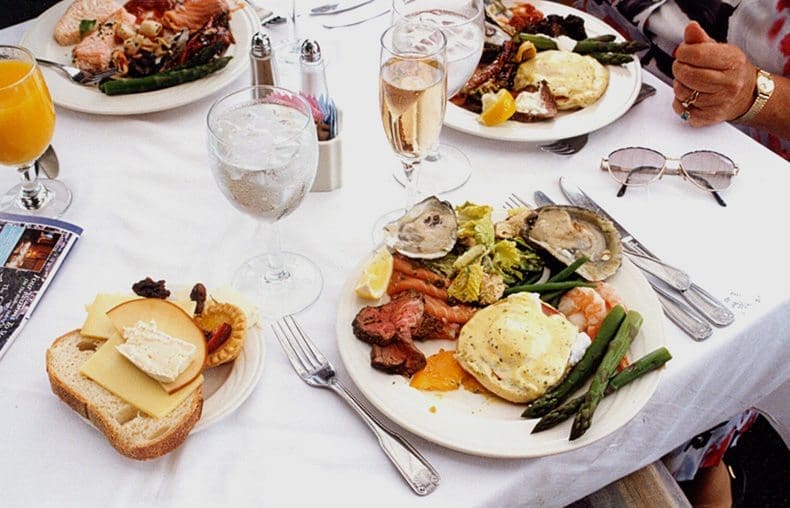Based on the first couple of chapters in Shawn Micallef’s The Trouble With Brunch: Work, Class and the Pursuit of Leisure, we weren’t sure if all we had a hundred pages of rhetoric on the author’s dislike of brunch and generalities of class based on personal experiences ahead of us. However, curiosity as to where it was all heading, Micallef’s inviting writing style, and his impressive resume had our interest piqued enough for us to continue. It’s a good thing we did, because The Trouble With Brunch is certainly an eye-opening, worthwhile read.
 When you hear the word “brunch,” what comes to mind? Is it enjoying eggs Benedict and mimosas at a trendy café after sleeping in late? Or is it digging into an unreasonably large portion of pancakes and bacon at your local greasy spoon after too many glasses of wine with friends the night before? Whatever it is, your feelings towards the notion of brunch are sure to change by the time you have finished this book. Micallef manages to relate everything about “brunching” — from the long lines to the food — to the subject of class.
When you hear the word “brunch,” what comes to mind? Is it enjoying eggs Benedict and mimosas at a trendy café after sleeping in late? Or is it digging into an unreasonably large portion of pancakes and bacon at your local greasy spoon after too many glasses of wine with friends the night before? Whatever it is, your feelings towards the notion of brunch are sure to change by the time you have finished this book. Micallef manages to relate everything about “brunching” — from the long lines to the food — to the subject of class.
Think that using a type of meal as a demonstration of class structure seems like a bit of a stretch? That’s what we thought too — until Micallef began laying out his points, each example more compelling than the last. Piece by piece, Micallef takes aim at the different aspects of brunch — where we want to dine, the foods and the quantities of those foods we wish to consume, how long we are willing to wait — and one after the other, he shows that each of these can show who we are, and perhaps more importantly, who we wish to be.
No doubt inspired to tackle the subjects of wealth and class by his middle-class Windsor upbringing, his move to Toronto, and his travels around the world, Micallef uses these experiences to great effect. He peppers the book with real-world examples from his life as well as newsworthy events. These examples serve as powerful demonstrations of opinions from the many economists, academics, and studies Micallef references. The back-and-forth between expert viewpoints and Micallef’s illustrations create intriguing arguments that will surely capture your interest and get you thinking.
As Micallef currently lives in Toronto, his examples are often ones Torontonians will be very familiar with. Neighbourhoods like Cabbagetown and Kensington are discussed, as are specific stores and brunch locations. So if you live in the area, you are sure to have plenty of “I know that place!” moments. But if you are not from Toronto, Micallef certainly won’t leave you behind. He details each specific reference so you can completely relate, even if you’ve never been there. His descriptions give such a clear image that you may even be able to pick out a similar location in your own neighbourhood that compares to the one being discussed.
What makes Micallef’s insightful discussions sure to stick with you well after you’re done reading is the fact that he shares terms that are too intriguing and catchy to forget. Some terms are clever and funny, like “Jenny-from-the-Block Syndrome” (where even if your career moves you into a new class, any time you go back home or reunite with people from your past, you are reminded of where you started from and therefore always see yourself as belonging to that class). Others, like “intellectual labour” (the fact many of us perform laborious and tiring work, but this work occurs almost entirely in the brain) simply allow you to see a concept you may already be familiar with from a new perspective.
However, the term that stands out most is without a doubt the “creative middle class.” This refers to the emerging group of 20- and 30-somethings who are less interested in the things that once improved one’s status (like fancy cars, impeccable grammar, and knowledge of dead languages and classical music) and feel in the know by being aware of up-and-coming new music, the specifics of craft beer, and how to find the most hip (but not too popular!) restaurants.
Using these terms, Micallef names situations and behaviours that we may see throughout our lives but never pause to truly think about and address.
Micallef has a clever, humorous writing style that is intellectual without being so complex that you would require a dictionary at hand. There are a few minor typos scattered throughout that may slow you down, but these mistakes shouldn’t interfere with your understanding of the discussion.
Without a doubt, Micallef has some very interesting points that he discusses in an in-depth, scholarly fashion. He is careful to keep his reader engaged by supplying plenty of real-world examples and using a subtle, but welcome, sense of humour when a little bit of mood-lightening is necessary. At times, Micallef will take you down a tangent that might have you wondering, despite its eye-opening observations, what the point is. Don’t get too concerned: he will soon bring it around back to the subject at hand and have you noticing all kinds of connections you had never realized existed before.
Don’t let the first half of the book title fool you. This is an informative, well-researched discussion on the subject of class and how it plays into some of the less tangible aspects of our lives such as leisure time. If you are looking for an easy summer read that will allow you to give your brain some R&R, The Trouble With Brunch probably isn’t the best option for you, but if you are ready to jump into a fast-paced hundred pages of intriguing discussion and clever observations that will likely have you rethinking everything you thought you knew about the middle class, give it a try.
SDVK

